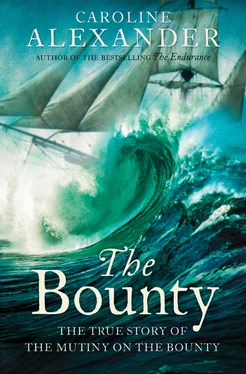While his ship was being prepared and stocked, Bligh toured Santa Cruz and made an informal survey of the harbour. He had been here before with Captain Cook, and this first port of call must have impressed upon him again the flattering thought that he was indeed following in his distinguished mentor’s footsteps. Although Santa Cruz was by now well-trodden ground, Bligh’s description of the town in his log is characteristically detailed and fulsome. In its barest form, a ship’s log was a record of daily weather, winds, mileage, position, and ‘Remarks’, which could be as spare as a simple notation of sails set and duties performed, or as descriptive as a proper journal, depending upon the nature of both the captain and his mission. Fortunately, Bligh was as meticulous in keeping his log as he was in performing all other aspects of nautical duty; by ‘Cloudy Weather,’ he observed in his preface, ‘is to be understood the Sun is not to be seen or but very seldom. Fair Weather or Open Cloudy Weather is when the Sun can be frequently seen…’ – nothing was left to chance. A log was also a legal document, a true and accurate account of daily proceedings, to be deposited with the Admiralty at voyage’s end. Bligh was to leave two logs of the Bounty voyage, one private and one official. Parts of each have been lost, but most of each survive, and when laid side by side they are identical in most respects. Where they do differ is enlightening; in general, Bligh was much freer with criticism of individuals, often named, in his private account, while such passages have been tactfully omitted in his official copy. Bligh’s logs of the Bounty are the only contemporary, running accounts of her voyage, written as events unfolded.
In the best expeditionary tradition, while at Santa Cruz Bligh had been careful to receive from the governor permission for David Nelson to do some botanizing in the surrounding hills. For his part, this time was mostly spent in overhauling his ship. His plan to replace damaged stores with fresh provisions, however, was disappointed, and in the end Santa Cruz supplied only 230 pounds of inferior beef, some pumpkins and potatoes. The Bounty had been victualled before departure with all the usual stores – biscuit, salt beef, pork, cheese, butter, malt, sauerkraut, peas, raisins, rum, spirits and beer, as well as the fairly innovative ‘portable soup’, slabs of dried bouillon intended as a defence against scurvy – calculated for approximately eighteen months of what would be at minimum a two-year voyage. Additional supplies, particularly fresh meat, greens and fruit, water and wood for fuel, were to be obtained en route at strategic ports of call, either by purchase or, where there were no settlements, by foraging.
Judging from the letters he wrote before leaving Tenerife, Bligh was in high spirits as he set out, despite his knowledge that the most problematic part of his journey – the rounding of Cape Horn – still lay ahead.
‘I have the happyness to tell you my little ship does wonderfully well,’ he wrote to Campbell. ‘I have her now the completest ship I believe that ever swam & she really looks like one fit to encounter difficulties…’ Before signing off, Bligh was pleased to inform him that a protégé of Campbell’s, young Tom Ellison, was ‘improving [and] will make a very good seaman.’ To Banks, Bligh reported that he and his men were ‘all in excellent spirits and I have still the greatest confidence of success in every part of the Voyage.’
On 11 January 1788, the Bounty fired a farewell salute and got under way. Only hours out to sea the ship was taken aback by rainy squalls. To ensure that his small crew would be as rested as possible for the almost certainly arduous passage ahead, Bligh ordered them into three watches, instead of the traditional two. In this manner, each watch was ensured a period of eight unbroken hours of sleep, instead of the traditional watch-and-watch – four hours on duty, four hours of sleep.
‘I have ever considered this among Seamen as Conducive to health,’ Bligh recorded in his log. ‘And not being Jaded by keeping on Deck every other four hours, it adds much to their Content and Cheerfulness.’ This was one of Cook’s innovations, and it undoubtedly was appreciated by Bligh’s men. In a decision that was to have unimagined consequences, Bligh designated Fletcher Christian, ‘one of the Mates’, as officer of the third watch.
As another measure against the uncertainties of the immediate passage ahead, Bligh mustered his company and announced that he was putting them on a ration of two-thirds allowance of bread or ship’s biscuit to ensure that it would last as long as possible. The sailors, respectful of what they knew the Horn could offer, understood this precaution, and according to James Morrison, it ‘was cheerfully received’.
The cloudy weather was soon cleared by fresh, light breezes. Four days out and the ship was actually becalmed, making only five miles in twenty-four hours. The men were kept busy airing bedding, drying bread, rechecking stores and sails. The light breezes returned and by 17 January the Bounty was ambling under clear skies through smooth seas.
‘Very pleasant Weather,’ Bligh logged. ‘All Sails set before the Wind.’ In these easygoing conditions he ordered the entire ship washed and then rinsed down with vinegar, which served as a disinfectant. This was to be a regular routine, as were his Sunday inspections of his mustered men, whose clothing and even fingernails he personally checked for cleanliness. Bligh’s model in this almost fetishistic concern for hygiene was Captain Cook. When Cook had found a man with dirty hands, he had stopped his grog. In an age in which more seamen were lost to disease than to naval wars, Cook had managed to return from voyages of several years’ duration with minimal fatalities. A diet of sauerkraut and sweet wort, or malt extract, the procuring of fresh produce wherever possible, the endless rigorous washings and inspections, the three watches – all these practices had been conscientiously noted by the young Bligh during his service to his formidable mentor and were now earnestly applied on his own little ship. Mandatory, and soon despised, dancing sessions were implemented under this same improving philosophy.
‘Sometime for relaxation and Mirth is absolutely necessary,’ Bligh had stated in his log, ‘and I have considered it so much so that after 4 O’Clock, the Evening is laid aside for their Amusement and dancing. I had great difficulty before I left England to get a Man to play the Violin and I prefered at last to take One two thirds Blind than come without one.’ This much-sought-after musician was the disagreeable Michael Byrn.
As the fair weather continued, the Bounty passed flying fish and porpoises, and occasionally spotted a shark. Towards the end of January, a fine moon shone on her as she sailed the dark night sea. Boobies, shearwaters and a man-of-war bird were seen, although far from land.
The pleasant and orderly passage was spoiled for Bligh by the discovery that his surgeon, the corpulent, lazy Thomas Huggan, was ‘a Drunken Sot’. Bligh was forced to record, ‘He is constantly in liquor, having a private Stock by him which I assured him shall be taken away if he does not desist from Making himself such a Beast.’ After all the effort and energy required to keep his ship clean scrubbed, his men in clean linen and clean habits, this was a bitter blow to Bligh. His worthy goal was to return his men as soundly as Cook would have done, and now the very individual he most required as an ally – his surgeon – had proved unfit. This meant increased vigilance of his men’s health and habits on Bligh’s part.
As the Bounty headed south, the weather thickened, becoming warmer – into the eighties – cloudier and wet. ‘Sultry & Hot,’ Bligh recorded on 26 January. ‘Got everything up from below & gave all the Air possible between Decks.’ The rainfall was never intense, but thunder and lightning often spread across the unbroken sky. Airing of the ship continued and on the last day of January, the Bounty was washed, yet again, with vinegar, so that ‘by the Evening the Ship was perfectly Sweet & refreshing.’ That same night, lightning played all around the heavens, while ‘a prodigious number of Porpoises’ swam with the ship through a sea aglow with luminous fish. The following evening as Bligh stood enjoying the spectacle of the Bounty ’s long wake at the close of a fine, clear day, he was horrified to see ‘a dreadfull breaking shoal’ rising directly in their tracks. How had he and his sharp lookouts missed this? Staring again, Bligh saw the ‘shoal’ resolve itself into a school of porpoises, their backs breaking the waves as would a sandbar.
Читать дальше












